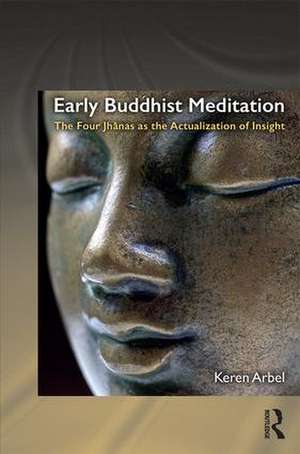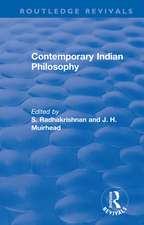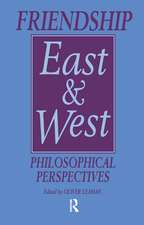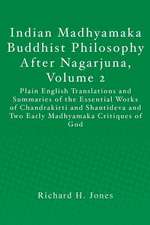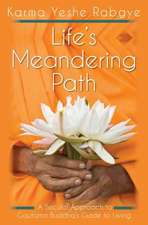Early Buddhist Meditation: The Four Jhanas as the Actualization of Insight: Routledge Critical Studies in Buddhism
Autor Keren Arbelen Limba Engleză Hardback – 23 feb 2017
Current literature on the phenomenology of the four jhànas and their relationship with the 'practice of insight' has mostly repeated traditional Theravàda interpretations. No one to date has offered a comprehensive analysis of the fourfold jhàna model independently from traditional interpretations. This book offers such an analysis. It presents a model which speaks in the Nikàyas' distinct voice. It demonstrates that the distinction between the 'practice of serenity' (samatha-bhàvanà) and the 'practice of insight' (vipassanà-bhàvanà) – a fundamental distinction in Buddhist meditation theory – is not applicable to early Buddhist understanding of the meditative path. It seeks to show that the common interpretation of the jhànas as 'altered states of consciousness', absorptions that do not reveal anything about the nature of phenomena, is incompatible with the teachings of the Pàli Nikàyas.
By carefully analyzing the descriptions of the four jhànas in the early Buddhist texts in Pàli, their contexts, associations and meanings within the conceptual framework of early Buddhism, the relationship between this central element in the Buddhist path and 'insight meditation' becomes revealed in all its power.
Early Buddhist Meditation will be of interest to scholars of Buddhist studies, Asian philosophies and religions, as well as Buddhist practitioners with a serious interest in the process of insight meditation.
| Toate formatele și edițiile | Preț | Express |
|---|---|---|
| Paperback (1) | 435.59 lei 6-8 săpt. | |
| Taylor & Francis – 27 sep 2018 | 435.59 lei 6-8 săpt. | |
| Hardback (1) | 820.32 lei 6-8 săpt. | |
| Taylor & Francis – 23 feb 2017 | 820.32 lei 6-8 săpt. |
Din seria Routledge Critical Studies in Buddhism
-
 Preț: 353.69 lei
Preț: 353.69 lei -
 Preț: 348.68 lei
Preț: 348.68 lei -
 Preț: 441.47 lei
Preț: 441.47 lei - 15%
 Preț: 404.88 lei
Preț: 404.88 lei -
 Preț: 426.90 lei
Preț: 426.90 lei -
 Preț: 390.31 lei
Preț: 390.31 lei -
 Preț: 482.74 lei
Preț: 482.74 lei - 18%
 Preț: 1330.16 lei
Preț: 1330.16 lei - 18%
 Preț: 1111.55 lei
Preț: 1111.55 lei -
 Preț: 482.53 lei
Preț: 482.53 lei - 13%
 Preț: 298.10 lei
Preț: 298.10 lei - 26%
 Preț: 820.21 lei
Preț: 820.21 lei - 25%
 Preț: 851.99 lei
Preț: 851.99 lei - 18%
 Preț: 1002.60 lei
Preț: 1002.60 lei - 18%
 Preț: 1059.84 lei
Preț: 1059.84 lei - 18%
 Preț: 1394.91 lei
Preț: 1394.91 lei -
 Preț: 468.36 lei
Preț: 468.36 lei -
 Preț: 486.42 lei
Preț: 486.42 lei - 18%
 Preț: 1010.26 lei
Preț: 1010.26 lei -
 Preț: 482.35 lei
Preț: 482.35 lei - 18%
 Preț: 1005.04 lei
Preț: 1005.04 lei - 18%
 Preț: 1224.24 lei
Preț: 1224.24 lei - 18%
 Preț: 1059.84 lei
Preț: 1059.84 lei - 25%
 Preț: 824.53 lei
Preț: 824.53 lei - 22%
 Preț: 322.89 lei
Preț: 322.89 lei - 18%
 Preț: 1057.40 lei
Preț: 1057.40 lei - 25%
 Preț: 131.51 lei
Preț: 131.51 lei - 31%
 Preț: 767.93 lei
Preț: 767.93 lei -
 Preț: 482.17 lei
Preț: 482.17 lei - 26%
 Preț: 821.46 lei
Preț: 821.46 lei -
 Preț: 483.33 lei
Preț: 483.33 lei -
 Preț: 391.39 lei
Preț: 391.39 lei - 18%
 Preț: 997.27 lei
Preț: 997.27 lei - 18%
 Preț: 1053.95 lei
Preț: 1053.95 lei - 18%
 Preț: 1387.26 lei
Preț: 1387.26 lei - 18%
 Preț: 1052.35 lei
Preț: 1052.35 lei - 18%
 Preț: 1114.98 lei
Preț: 1114.98 lei
Preț: 820.32 lei
Preț vechi: 1103.01 lei
-26% Nou
Puncte Express: 1230
Preț estimativ în valută:
156.96€ • 163.89$ • 129.91£
156.96€ • 163.89$ • 129.91£
Carte tipărită la comandă
Livrare economică 04-18 aprilie
Preluare comenzi: 021 569.72.76
Specificații
ISBN-13: 9781138937925
ISBN-10: 1138937924
Pagini: 234
Dimensiuni: 156 x 234 x 19 mm
Greutate: 0.48 kg
Ediția:1
Editura: Taylor & Francis
Colecția Routledge
Seria Routledge Critical Studies in Buddhism
Locul publicării:Oxford, United Kingdom
ISBN-10: 1138937924
Pagini: 234
Dimensiuni: 156 x 234 x 19 mm
Greutate: 0.48 kg
Ediția:1
Editura: Taylor & Francis
Colecția Routledge
Seria Routledge Critical Studies in Buddhism
Locul publicării:Oxford, United Kingdom
Public țintă
PostgraduateCuprins
Introduction
1. The fourfold Jhàna Model: Buddhist or Not?
2. The First Jhàna: A Turning Point in the Spiritual Path.
3. The Second Jhàna: Non-discursive Broad Field of Awareness.
4. Awakening-jhàna Factors.
5. The Third Jhàna: Establishing a Specialized Form of Awareness.
6. The Fourth Jhàna: Non-reactive & Lucid Awareness of the Phenomenal Field.
7. Morality (sila), Wisdom (pannà) and the Attainment of the Jhànas.
8. Reconsidering Samatha-bhàvanà, Vipassanà-bhàvanà & Pannà-vimutti.
Final Reflections
1. The fourfold Jhàna Model: Buddhist or Not?
2. The First Jhàna: A Turning Point in the Spiritual Path.
3. The Second Jhàna: Non-discursive Broad Field of Awareness.
4. Awakening-jhàna Factors.
5. The Third Jhàna: Establishing a Specialized Form of Awareness.
6. The Fourth Jhàna: Non-reactive & Lucid Awareness of the Phenomenal Field.
7. Morality (sila), Wisdom (pannà) and the Attainment of the Jhànas.
8. Reconsidering Samatha-bhàvanà, Vipassanà-bhàvanà & Pannà-vimutti.
Final Reflections
Notă biografică
Keren Arbel holds a PhD in Buddhist Studies and teaches at the Department of East Asian Studies in Tel Aviv University, Israel. Her research interests include early Buddhism, Buddhist Meditation, Indian contemplative traditions, and South Asian Buddhism.
Descriere
Offering a fresh look at an important element in Buddhist meditation, this book looks at the relationship between ‘insight practice’ and the attainment of the four jhanas, providing a novel map of the theoretical progress of meditation according to early Buddhist texts. The book demonstrates that the four jhanas have been misunderstood in Buddhist psychology and philosophy, by inaccurate interpretations and oversights of key terms and aspects of the meditation process. By carefully analysing all aspects of the four jhanas, the relationship between this central element in the Buddhist path and ‘insight meditation’ is revealed in all its power.
